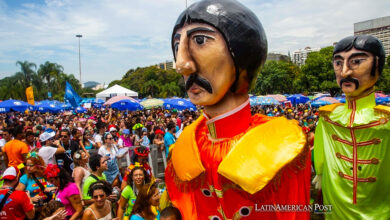“At 11 we close.” Bogotá, the city of immortal culture
I am thinking of arriving at Amber cafe, a nice place that serves as a cultural office.

Street of the city of Bogotá, Colombia. / Photo: Pixabay – Reference Image
Escucha este artículo
Leer en español: “A las 11 cerramos”. Bogotá, la ciudad de la cultura inmortal
Friday, 8 PM. Bogotá, Galerías neighborhood. I cross the street of the Panamericana bookstore, full of cars and people at that time. I am thinking of arriving at the Amber café, a nice place that serves as a cultural office, an after-work meeting, a regular conspirator.
I want to be there, have a couple of cold beers, as it should be, read my book if I can, and say hello to my friend Cristóbal Valdemar Moreno, poet, who at this time of night surely is with his friends, all mature, all educated, former militants of some cause, gentlemen yes, professionals, from other eras, funny clothes – scarves, berets, cane umbrellas -, revolutions, governments already finished, fights consumed and perennial love almost denied.
They are together in this space today, and friends for years in previous spaces that have been fading. Bogotá spaces that got tired of existing, that dried out of social gatherings. They do not, however. Since last year they had a session at the Amber café because Havana Café was closed, a coffee shop as old and picturesque as they are, with good music they say.
These people, with their berets and scarves and jugs with their own names, have the spell of turning the place where they are into something like an English gentlemen's club. Tonight, at 8 PM, the Amber coffee table number one is full of aristocrats, as I call them. You don't know if it was this cafeteria that found them, or it was they who found it.
Upon entering I see all of Cristóbal's friends, occupants of table one, dressed in jackets, sweaters, berets, scarves, white beards, as if they were going to see a distant bride or coming from an office. A slight aristocratic aura distinguishes them. That's why I call them the "aristocrats." On table one, their table, there are white jugs with their names and that confirms that they are in “session”. A few tables, to contrast with them, there are some young people talking about technology.
I finally sit at a table in the middle of the cafe, I see the whole picture: slight laughter on all the tables, cigarette smell, steaming cups, coffee, white jugs, and beer glasses. I look again and skip a detail that eludes the look but it is concrete: the distance between the table of the aristocrats and the young; A whole meridian. Suddenly, a couple arrives, they settle to the bottom of the cafe. They don't laugh so much. Me, in the middle of the place I consider my office without the owner noticing, my book and the sound of boleros in the background complete the picture. Curious Friday night painting, I told myself, until the guitar duo arrived.
The duo that had to be a trio entered the cafe. I wonder what happened to the third guitar of the trio that was a duet that night. Usually, there are three guitars as on the covers of the vinyl that I saw in my childhood: suits of the same color, almost always dark, thin tie, the same hairstyle, smiling faces for the cover, and, of course, three guitars. It might be that the third, who was not there that night with his friends in the cafe, was already waiting for them in the path of time; Or maybe he was near looking for more opportunities for the trio of friends.
Can be. They approached my table and asked shyly if I wanted to hear something, a little song, three songs for fifteen bucks, they said. Out of shame, I confess, I told them no, so they started touring the cafe looking at each table, the empty ones too, as if wishing they were busy to repeat the offer. They arrived where the couple was, at the bottom of the cafe, and did the same: smile and kindly offer songs. The couple also said no, shame, I think.
Also read: 'Restaurante Interno': a second opportunity for inmates
The trio repeats the question to Cristóbal's friends, the group of the distinguished white jugs, the rectors of the gathering; I begin thinking that the trio, which was duet that night, and the aristocrats would be a good combination; for everything: for his mature youth, for shared tastes, times. And I was right.
They made a combination beyond what I imagined. The aristocrats said yes, and suddenly, as in choreography, the background music continued to disappear smoothly. It was the owner of my cultural office who, expertly, was lowering the volume of the music. Silence for a few seconds, looks of complicity between the duo-trio, and the guitars sounded.
The guitars sounded (they play A unos ojos. Waltz). The cultural office, the Amber café, was filled with the sound of the strings, sweet, of the poetry of the songs, of voices, laughter at all the tables. "Your eyes that I contemplate with delight have the same glow of dawn, have the softness of a caress, and the sweet look that falls in love." (“Tus ojos que contemplo con delicia tienen el mismo brillo de la aurora, tienen la suavidad de una caricia, y la dulce mirada que enamora”) When I realized, I was singing with them and the shame from before went out of the window.
Healthy, romantic joy took its place. The tables of the young and the aristocrats, and all, previously separated by distances rather than physical, joined imaginarily and in each of them, new friends, relatives, acquaintances appeared, even if they were not there. My grandparents, my childhood, and three hundred kilometers from here, my son Joseph. "They know how to cry with grief when I cry, and they fill with love when I kiss them" (“Saben llorar de pena cuando lloro, y se llenan de amor cuando los beso”).
In what was already a predestined singing and without programming (guitars, corridors, voices and gestures of emotion) the amazing thing appeared: Bogotá's humor. It took advantage of the brief silences of the songs to exploit accusative jokes, typical of the capital, endemic jokes, between bold and conservative. These elaborate jokes denote a transfer of knowledge taught by parents, and these their grandparents
—And the service? I see that they didn't sing three stanzas in the previous round (inspection and signaling to the trio) – the lawyer.
—It's really healthy. This has no change (health advice) – the doctor.
—Accept credit card (question to means of payment of the trio) —the economist.
—And the service (in the third round already). This is the last time we hired them (sentence for the trio) —the lawyer.
—A good guitar is missing and this is composed (diagnosis and restructuring) —the engineer.
—Then pay a basket, you jerk (replica of the trio) – of the trio, duo, without a name.
Teasing, provocative, with gestures of respect, came and went between the trio —that night they were a duo— and the aristocrats, and between the aristocrats and themselves. From my table I saw these sparkling capital swings jumping from one table to another, strengthening the bridges that music raised. The tables representing distances, of all kinds, are now one, one age, one culture,
It was almost 10 PM. (Amor se escribe con llanto. Bolero) I see everything again as in slow motion: arched eyebrows, eyes closed, voices that regardless of the record sounded good, smiles and respectful jokes. "Love you sowed one day, roses of hope, in my soul. ( "Amor que sembraste un día, rosas de esperanzas, en el alma mía")" People enjoying their emotion. Some hands rising point to the sky. Maybe, dedicating someone up there phrases from the songs. "I adored you, and despite loving you so much, today you have taught me, what love is written, with tears." ("Te adoré, y a pesar de quererte tanto, hoy me has enseñado, que amor se escribe, con llanto".) The lady at the table tells her husband that it is time to go. Yes, he answers, but they didn't leave.
10:30 PM. (Now they play Romance de mi Destino. Pasillo). "Everything I wanted, I had to leave it away." ("Todo lo que quise yo, tuve que dejarlo lejos") At the table of the aristocrats, my friend Cristóbal, the poet, raises his arm to ask the clerk of my office for another "spray" referring to the cups. Sprayed? I asked imagining the answer that surprised me: Pedro Manuel, the writer, explains that yes, sprayed like in the gardens, because at this table he says, with aristocratic elegance, we are all flowers. "The only flower I know is the wind rose."
10:50 PM Tonight I witnessed Bogotá and the encounter of two of its worlds: the current one, in which we live, and that of the guitar trios, the aristocrats, the gatherings, the capital jokes, the married couples, the open friendship, and the sound coffees. The night that resists the day, with elegance, and the new century and its journeys.
The trio – that night was a duo -: year 2019 and look at them, with your eyes closed and singing, alive. Who would say they are immortal. That night at the Amber café I witnessed culture in shock: the old-fashioned bohemia with the brisk youth. The ones started singing songs maybe because they reminded them of their parents; the others because maybe they reminded them of their children. The coffee summons them, the music welcomes them, the trios and the guitars excite them, and the culture unites us.
"At 11 we closed," said the owner of my cultural office.




